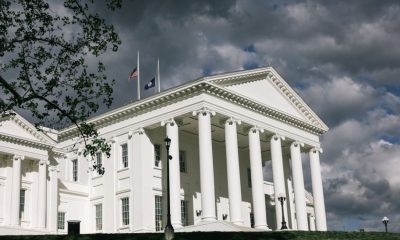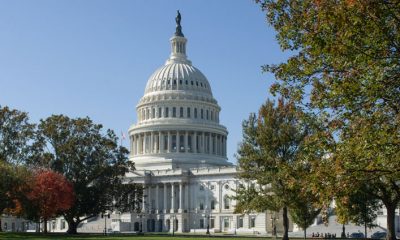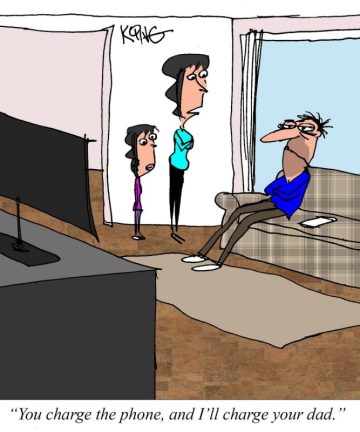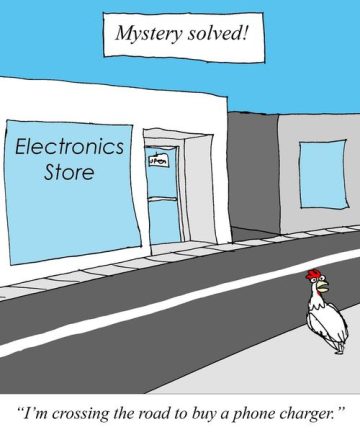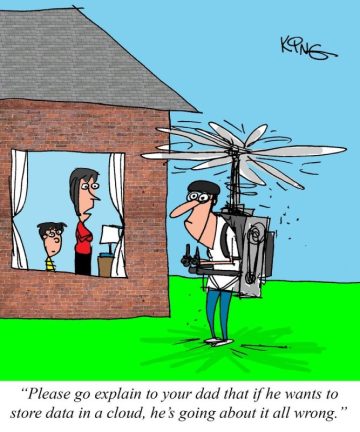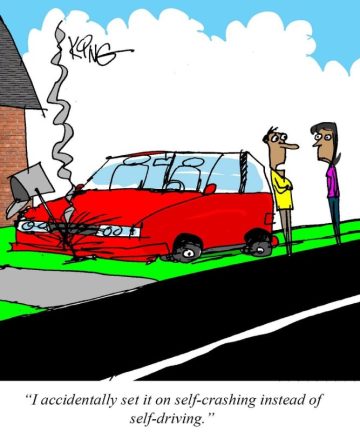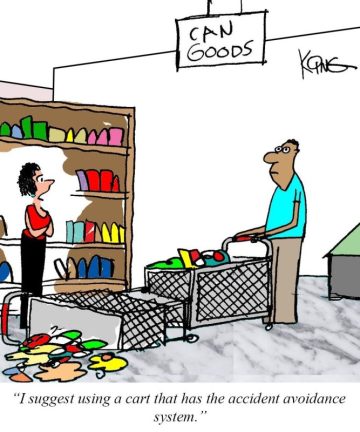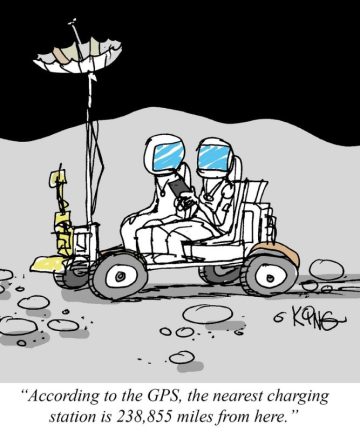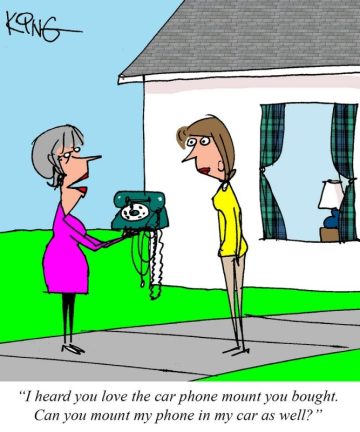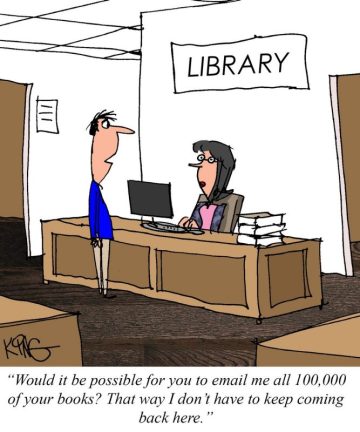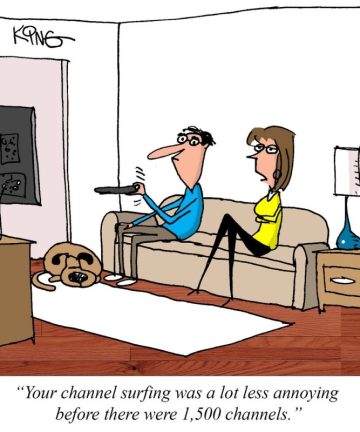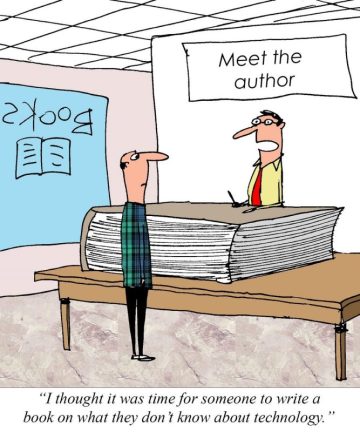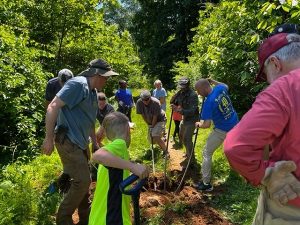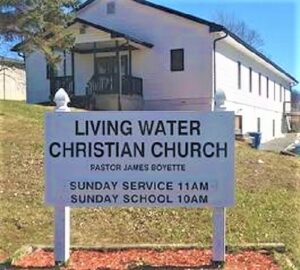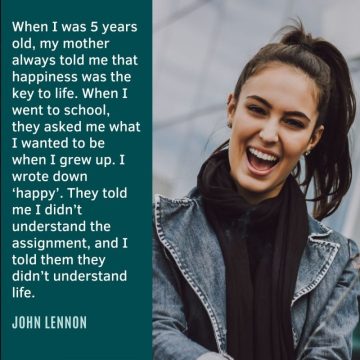State News
After applying for funding tied to red flag law, Youngkin officials vague on plans to use it
Gov. Glenn Youngkin’s administration last fall applied for federal funding meant to help Virginia continue to implement its red flag law, a gun control measure strongly opposed by many Republican lawmakers and gun rights activists. State officials say the roughly $5 million hasn’t been formally accepted, and no decisions have been made about how it might be used.
Virginia’s system of substantial risk orders (SROs), created by legislation Democrats passed in 2020 and colloquially known as the red flag law, remains a controversial subject for conservatives, who have called for its repeal but currently lack the legislative majorities needed to scrap it.
Youngkin has billed himself as a gun rights supporter, but his position on red flag laws is unclear. The governor’s office did not provide an answer when asked where he stands on the issue. Youngkin, who is widely thought to be considering a run for president, has seemed less eager to lean in on guns than he has been on other hot-button cultural topics like abortion and how to handle race and gender issues in public education.
It’s also unclear how a Republican governor appearing to lend tacit support to a red flag law he didn’t sign might play in a GOP presidential primary, but some gun rights proponents in Virginia are calling for Youngkin to reject the federal funding altogether.
“I expected better from Governor Youngkin on that,” said Philip Van Cleave, president of the pro-gun Virginia Citizens Defense League. “This needs to be repealed, not expanded.”
Red flag laws have been pitched around the country as a way to prevent mass shootings, suicides, and other violence carried out by people with a demonstrated history of threatening or erratic behavior. Under Virginia’s law, judges and magistrates can order guns to be seized from people deemed a danger to themselves or others for up to 14 days before a court hearing is held to give the affected person a chance to argue their firearms should be returned.
Proponents of red flag laws see them as a reasonable precaution to try to prevent some troubled people from lashing out violently, given the repeated examples of mass shootings carried out by people who had shown clear warning signs but were still able to purchase and possess firearms.
Criticism of the laws is largely based on due process concerns and opposition to the idea of letting police seize firearms from people who may never be charged with a crime.
In mid-February, President Joe Biden’s Department of Justice announced it had awarded roughly $231 million in crisis intervention grants to states, the District of Columbia, and U.S. territories. That funding, part of the Byrne State Crisis Intervention Program, was included in a bipartisan anti-gun violence bill Congress passed in 2022 after mass shootings at a Buffalo, New York supermarket and an elementary school in Uvalde, Texas.
Though the funding can be used for a variety of anti-violence initiatives, the Department of Justice’s description of the program and Virginia’s application for the money put a clear emphasis on promoting the use of red flag laws. Lori Haas, a Virginia gun violence prevention activist, said the state should follow through with using the money for its intended purpose.
“Law enforcement agencies across the commonwealth need staff and training to robustly implement risk orders in the commonwealth,” said Haas, advocacy manager for the Center for Gun Violence Solutions at the Johns Hopkins School of Public Health. “Some jurisdictions have embraced using this tool to prevent gun violence, but far too many have not.”
The red flag angle was spelled out clearly in a funding application submitted by the Virginia Department of Criminal Justice Services.
In its application, the agency said it expected to use the funding on training to help law enforcement, courts, prosecutors, and public health officials with crisis intervention and tools available to reduce gun violence.
“DCJS will also fund grant applications that seek to increase law enforcement agencies’ understanding of Virginia’s substantial risk order laws, including when they are applicable and how to initiate and carry out the SRO petition process,” said the application, which the Virginia Mercury obtained through a Freedom of Information Act request. “This funding will help expand the reach of DCJS’ current training efforts related to SRO implementation and awareness in Virginia.”
In addition, the application said Virginia expects to use the funding to help law enforcement and local government agencies “more safely and efficiently store, track and return firearms relinquished” under the red flag law.
The document also says funding could be used on broader behavioral health initiatives meant to help people in crisis and improve training for public officials on how to respond effectively.
In an email, DCJS Director Jackson Miller indicated plans for the funding are less clear than the application suggests.
“No decisions have been made on how Virginia will use the funds if/when the funds are accepted,” Miller said.
The federal grant money comes with a “pass-through” rule requiring 40% to be allocated to local government officials for locally designed programs. It’s unclear how much discretion the state would have to dictate how localities can or can’t use the money. The federal program’s guidelines call for the creation of state-level Crisis Intervention Advisory Boards that would approve plans for how the money should be spent.
Miller said there’s no deadline for Virginia to accept or reject the funding. A spokesman for the DOJ’s Bureau of Justice Assistance, which is overseeing the grant funding, said Virginia must accept the money by Sept. 30, 2026, when the grant period ends.
by Graham Moomaw, Virginia Mercury
Virginia Mercury is part of States Newsroom, a network of news bureaus supported by grants and a coalition of donors as a 501c(3) public charity. Virginia Mercury maintains editorial independence. Contact Editor Sarah Vogelsong for questions: info@virginiamercury.com. Follow Virginia Mercury on Facebook and Twitter.
State News
Virginia Legislature Will Consider Reworked State Budget in May 13 Special Session
Gov. Glenn Youngkin and lawmakers have agreed to work together on the biennium budget, after clashing for weeks over two distinctly different spending plans.
A special session will be held on May 13, Youngkin and lawmakers in both chambers announced Wednesday, to consider the revamped budget and prevent a shutdown ahead of July 1, when the current budget expires.
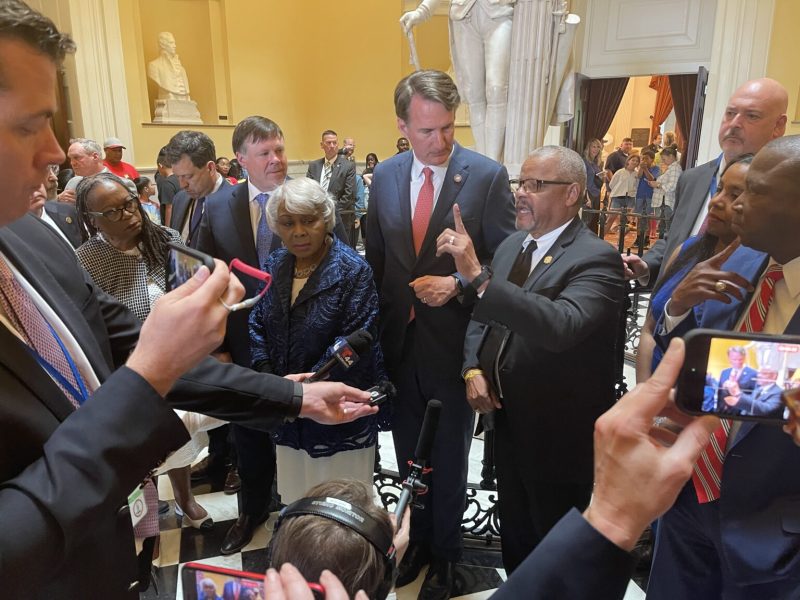
Gov. Glenn Youngkin was joined by Democratic and Republican leaders from both chambers in the Capitol’s rotunda on April 17. (Nathaniel Cline/Virginia Mercury)
On Wednesday, the House of Delegates voted to reject all 233 of the governor’s amendments to the budget, and agreed to seek a new budget to present to the legislature May 13, with voting on it expected May 15. They also took up the governor’s other bill amendments and 153 vetoes.
The House accepted all Youngkin’s vetoes, including bills that would have raised the minimum wage, created a Prescription Drug Affordability Board to cap drug prices, protected people who come to Virginia for reproductive health care from extradition and prohibited assault firearms in public places.
Future of skill games in Virginia still unclear as Senate rejects Youngkin’s proposal
The bill amendments up for debate included: changes to legislation that would legalize skill machines, which was rejected by the Senate; a measure that would lower the amounts Dominion Energy and Appalachian Power Company can recover from customers for their pre-construction costs of a small modular reactor, which was adopted in their respective chambers; and another that would require school boards to notify gun-owning parents annually of their responsibility to safely store firearms to keep them away from their children, which was also rejected by the delegates.
It’s not clear what will happen to the language the legislature included in its budget that would’ve ordered the state to rejoin the carbon market known as the Regional Greenhouse Gas Initiative, or RGGI, that incentivizes electricity producers to emit less carbon by making them purchase allowances to do so.
Youngkin — who passed a regulation that withdrew Virginia from RGGI despite RGGI supporters saying a legislative change was needed — has opposed participation in RGGI, while calling the fee for the allowances that utilities can recover from ratepayers a “hidden tax.” The regulation withdrawal is being challenged in court.
The budget delay also creates uncertainty for local governments trying to estimate how much funding schools will receive and the Washington Metropolitan Area Transit Authority, or Metro, which is seeking additional funding from the state to bridge its $750 million shortfall.
Before Wednesday’s veto session, the governor tried compromising on the budget with lawmakers by removing all tax increases they had approved — including the digital service sales tax he initially proposed — but also dropping the tax cuts he requested in December.
In the Capitol’s rotunda with Democratic and Republican leaders from both chambers Wednesday afternoon, Youngkin said all parties are close to a budget agreement after meeting over the last few days.
“We believe this is a good path forward for the commonwealth,”Youngkin told reporters. “It reflects the work that has been done from the General Assembly and from the governor’s office.”
He added that no decisions have been made yet on the specifics of the budget, including tax increases, but he looks forward to meeting with leaders.
“This was a collective decision, and you will see from the vote this morning that it is unanimous amongst all of us to press forward in this fashion,” Youngkin said.
House Appropriations Committee Chair Luke Torian, D-Prince William, added, “We agreed that there is nothing that’s off the table. Everything will be up for discussion and deliberations. No decisions have been made at this point.”
Senate Finance and Appropriations Committee Chair Louise Lucas, D-Portsmouth, told a reporter that they were “absolutely correct” that envisioning the governor, Democrats and Republicans standing together in the rotunda two months ago was unlikely to happen when there were different budget priorities on both sides, including Youngkin’s arena proposal to bring two professional sports teams to Northern Virginia and the Democratic-controlled legislature’s plan to raise the minimum wage and allow retail cannabis sales in the state.
“But I think what’s changed is that there has been a lot of collaboration,” Lucas said. ”I think nothing helps the process more than everybody getting together, sitting around the table and talking about what we can all do to help Virginia. I think we all had different ways we thought we were going to get there, but I think now we are going to work together towards something that will keep the temperature down a little bit.”
Sen. Ryan McDougle, R-Hanover, who, along with Lucas, met with the governor earlier this week, said he is optimistic about the process moving forward.
“That’s how you come to a resolution,” McDougle said. “Everybody’s got to come to the table and talk and be heard and once you do that you can find solutions.”
by Nathaniel Cline, Virginia Mercury
Virginia Mercury is part of States Newsroom, a nonprofit news network supported by grants and a coalition of donors as a 501c(3) public charity. Virginia Mercury maintains editorial independence. Contact Editor Samantha Willis for questions: info@virginiamercury.com. Follow Virginia Mercury on Facebook and Twitter.
State News
Future of Skill Games in Virginia Still Unclear as Senate Rejects Youngkin’s Proposal
The fate of slots-like skill games in Virginia convenience stores and truck stops remained in limbo Wednesday as the state Senate voted to reject Gov. Glenn Youngkin’s sweeping changes to a proposal to legalize and tax the gambling machines.

Sen. Aaron Rouse, D-Virginia Beach, spoke to reporters at the Capitol while surrounded by skill game supporters who back the legalization bill he’s sponsoring. (Graham Moomaw/Virginia Mercury)
The Senate voted 34-6 to reject the governor’s tougher amendments to the bill, sending the legislation back to Youngkin in its original form.
Virginia lawmakers return to Richmond as budget battle fuels shutdown talk
The bipartisan move raises the risk Youngkin could veto the legislation, an outcome that would leave skill games prohibited throughout Virginia by a ban enacted under former Gov. Ralph Northam. But lawmakers also announced Wednesday that they’re planning a special session later this spring to reach a deal on the state budget, creating an opening to reconsider the skill game issue over the next few weeks.
“I recognize that this bill faces an uncertain future if it goes back to the governor’s desk,” said Sen. Aaron Rouse, D-Virginia Beach, the bill’s lead sponsor in the Senate. “But… I stand with small businesses in every corner of our commonwealth urging the governor to do right by small businesses and sign this bill.”
Virginia’s skill game ban — which was passed in 2020 but didn’t take effect until 2021 after lawmakers gave the industry a one-year grace period due to COVID-19 — was suspended for nearly two years as the skill game industry fought it in court. The Supreme Court of Virginia reinstated it late last year, rendering the machines illegal and prompting the industry to launch a new lobbying push to change the law.
Things appeared to be going well for skill game supporters until the bill got to Youngkin, who had signaled in February that he had “serious concerns” with the proposal. Last week, the governor unveiled amendments that would impose a higher tax rate on the machines, more regulatory safeguards and strict geographic limits that would effectively ban the machines in most of the state’s metro areas.
The governor wanted a 35% tax rate on the machines, while the General Assembly approved a 25% tax rate. Skill game supporters claim Youngkin’s amendments would create a tax rate of up to 45%, but the administration has said that’s a misread of the bill and the suggested rate is indeed 35%.
In a statement Wednesday evening, Youngkin’s office reiterated its qualms about the legislation while indicating the governor is open to revisiting the geographic limits skill game backers took issue with.
“The governor’s concerns with the bill remain and his amendments addressed those concerns,” said Youngkin spokesman Christian Martinez. “He is open to continuing discussion to alleviate issues with both perimeter provisions.”
Proponents of legalizing skill games have portrayed it as a matter of fairness, arguing that since Virginia has legalized numerous other types of gambling there’s no reason the machines that generate revenue for small business owners should be treated more harshly. Opponents of the bill say the state shouldn’t allow a gambling free-for-all or reward businesses that exploited a legal loophole to profit from gambling machines that have been unregulated and untaxed for most of their existence in Virginia.
The Senate appeared to consider a second vote on the skill game bill to preemptively override a potential veto. But the body didn’t follow through on that effort, which would have required two-thirds votes in both legislative chambers. The House of Delegates, which had approved the skill game bill by a narrow 51-45 margin, didn’t take up the skill game bill Wednesday. Because the bill originated in the Senate, the Senate’s decision to reject Youngkin’s amendments sent the bill straight back to the governor.
The policy specifics of what the governor recommended drew little discussion in the Senate, which completed its action on the skill game bill Wednesday in about five minutes.
Rouse, the only senator who spoke on the bill, said the “most egregious” elements in Youngkin’s proposal were the geographic limitations that would outlaw the machines in the state’s most populous regions. Youngkin’s version of the bill would have prohibited skill games within 35 miles of licensed casinos and Rosie’s facilities affiliated with the Colonial Downs horse racing track. The governor also suggested banning skill games within 2,500 feet of schools, day cares and places of worship.
In a seemingly less controversial amendment, Youngkin proposed giving cities and counties the ability to ban skill games locally. The bill sent to him had no provisions for local control, legalizing the machines statewide with no ability for communities to opt out.
The governor had also suggested tougher regulations requiring the industry to verify the identity of players before they put money into the machines, a system that could help prevent minors and people seeking help for gambling addiction from playing skill games. The bill the legislature passed also bars people under 21 from playing and has provisions for gambling addiction, but was less clear on how those rules would be enforced since skill games aren’t as closely supervised as slot machines on a casino floor.
Del. Paul Krizek, D-Fairfax, a skill game critic who has pushed for tougher regulations on the industry, said the legislature could have avoided a veto by rejecting the 35-mile rule while leaving the rest of Youngkin’s suggestions.
“I’m a big believer that half a loaf is better than no loaf,” Krizek said. “I’m sure there’s things that the governor could meet them halfway on.”
A large group of convenience store owners gathered at the Capitol Wednesday morning to applaud lawmakers seen as skill game allies and criticize Youngkin for amendments they felt were overly harsh and not in tune with reality.
Convenience stores shut down Virginia Lottery sales in protest for skill games
Munir Rassiwala, who owns several convenience stores around Virginia, said he voted for Youngkin but was disappointed the governor seemed to think protecting the investments casinos have made is more important than helping smaller entrepreneurs like him.
“There should be a compromise,” he said. “There are lives at stake.”
Sen. Bill Stanley, R-Franklin, a skill game supporter, encouraged the crowd to keep up the fight.
“Hopefully cooler heads prevail both in the governor’s office and here in the legislature,’ said Stanley, a lawyer who has done work for Pace-O-Matic, a major skill game company lobbying for the legalization bill. “I think ultimately a solution for the budget and for skill games is in the works.”
Virginians Against Neighborhood Slot Machines, an anti-skill game advocacy group funded by casinos, urged Youngkin to veto the bill.
“That is the only course of action to ensure public safety, protect vulnerable communities and to prevent every neighborhood in Virginia from becoming a mini-Las Vegas,” the group said in a statement. “It should tell Virginians everything they need to know that ‘skill games’ proponents threw a tantrum at the mere prospect of modest regulatory protections.”
by Graham Moomaw, Virginia Mercury
Virginia Mercury is part of States Newsroom, a nonprofit news network supported by grants and a coalition of donors as a 501c(3) public charity. Virginia Mercury maintains editorial independence. Contact Editor Samantha Willis for questions: info@virginiamercury.com. Follow Virginia Mercury on Facebook and Twitter.
State News
Youngkin Proposes Uing NoVa Investment Fund to Support Metro
In a state budget amendment, Gov. Glenn Youngkin pledged to support Metro with an additional $133.7 million amid a projected shortfall for the transit agency. The pledge came with a caveat: It would strip funding from a transit investment fund used by Northern Virginia jurisdictions.
Leaders from the Northern Virginia Transportation Commission, the regional body of jurisdictions responsible for funding Metro, urged lawmakers to reject the amendment.
“The General Assembly worked hard and came to [a] compromise, and we believe it’s the right thing to do to reject the amendment and then re-engage with the administration to find common ground and this is not something that we believe the governor is ideologically opposed to,” said Matt de Ferranti, commission chair.
Last week, the governor announced his pledge after the Washington Metropolitan Area Transit Authority, which operates Metro, projected a $750 million shortfall next fiscal year, starting during the summer. In Youngkin’s initial budget proposed in December, he did not include any additional funds for the transit agency.
Since then Virginia’s jurisdictional partners Maryland and the District of Columbia have committed millions to Metro. D.C. has committed up to $200 million, and Maryland is pledging $150 million.
In 2018, the three jurisdictions established a dedicated funding source for Metro to help address any maintenance issues. The Virginia General Assembly created the WMATA Capital Fund to uphold its portion of the agreement.
In December, the governor told reporters that Metro must create a plan to address the change in ridership and service demand before any additional funding is appropriated.
The governor’s proposal
Youngkin’s proposal is less than the $149.5 million proposed by lawmakers, who did not intend to use funds from NVTC.
According to the budget amendment, Virginia would provide $35.7 million from the general fund to NVTC in fiscal year 2026 to support operating assistance for Metro, in addition to the $98 million supplemental allocations held by NVTC.
The commission said in an April 12 letter to lawmakers that the $98 million was given under previous Democratic Gov. Ralph Northam’s administration for the localities to use to address the immediate Metro payments as the country emerged from the pandemic.
Under the governor’s amendment, the letter said, the commission would be required to pay its normal Metro operating bill, which is approximately $340 million, and an additional increase of $119 million in fiscal year 2025.
The funds would have helped with matching the General Assembly’s allocation to address the projected two-year, $263 million increase in Virginia’s Metro bill: $119 million in fiscal year 2025 and $144 million in 2026.
The letter states that the governor’s intended action would place an overly “disproportionate burden” on local budgets in the counties of Arlington, Fairfax and Loudoun, and the cities of Alexandria, Fairfax and Falls Church, who would “need to look to taxpayers a second time, beyond the existing local investments already being made in Metro.”
If the NVTC Trust Fund was exhausted, de Ferranti said, it would delay funding road and bike lane projects in the region.
As part of the governor’s plan, additional funds to the transit agency could increase depending on whether Metro meets the administration’s proposed criteria, including hiring a consulting firm to help the transit agency save money and to review how it is managing funds.
The firm would be required to submit its findings to WMATA by Nov. 30, as well as to the governor, and the chairs of the House and Senate Appropriations committees.
Metro will also be required to provide a management plan to the state for approval by Jan. 15, 2025.
The commission wrote it is concerned about the “procedurally complex and overarching reporting and approval conditions” for the agency Metro on top of other regional efforts.
“Adding more steps beyond the oversight requirements contained in [the] existing code would undo efforts to have clear lines of authority and add financial uncertainty to the flow of funding, disproportionately affecting NVTC and its jurisdictions,” the letter reads.
Helping Metro
Last week, Metro joined the Metropolitan Washington Council of Governments in announcing the launch of a new joint initiative to create a “unified vision” for transit service in the region as Virginia lawmakers weigh the governor’s proposal and conditions.
The initiative comes after the jurisdictions learned more about Metro’s financial challenges to maintain services. Council members also expressed interest in identifying funding and accountability solutions, both in the near and long terms.
“Our public transit network is our region’s most significant, shared asset,” said Clark Mercer, executive director for COG, who added he was pleased leaders are “seizing this valuable opportunity to collaborate and ensure the region’s public transit is positioned for long-term success.”
Council suggests Virginia reset subsidy payments to Metro amid budget shortfall
Randy Clarke, Metro’s general manager and chief executive officer, said on Friday’s The Politics Hour radio show that he expects the Board of Directors to vote on its budget next week, which avoids those “draconian” service cuts.
According to Metro, some of the agency’s proposed changes include eliminating bus service on 67 of 135 lines, reducing bus service on 41 of 135 lines, a 20% general increase in fares and parking rates, reducing rail service and closing 10 stations.
Nearly two dozen groups, including the Coalition for Smarter Growth, Virginia Bicycling Federation and the Southern Environmental Law Center, signed a statement urging lawmakers to reject the governor’s amendment and restore the funding approved by the General Assembly.
“Failure to provide additional state funding will have dire consequences for the workforce and economy of Northern Virginia and the D.C. region,” the April 12 statement reads. “It would mean massive service cuts and fare hikes at Metro, higher transportation costs for workers, and more congestion on the roads, and discourage next generation companies and workers from locating in the D.C. region.”
While Clarke shied away from commenting on the governor’s decision to pledge less than what the General Assembly voted on, he did say that the current funding model is “complex” and “non-traditional” in the transit industry, which prevents the agency from being able to fully predict its ongoing service needs in Virginia, Maryland and D.C.
“The fact that we kinda go through this every other year is unhealthy for Metro. [Metro] can’t do good service planning, workforce planning, capital fleet planning,” Clarke said.“It’s also is not good for our jurisdictional partners.”
According to NVTC, Metro has continued to be a “key economic driver” for the commonwealth, generating $1 billion in state tax revenue annually.
by Nathaniel Cline, Virginia Mercury
Virginia Mercury is part of States Newsroom, a nonprofit news network supported by grants and a coalition of donors as a 501c(3) public charity. Virginia Mercury maintains editorial independence. Contact Editor Samantha Willis for questions: info@virginiamercury.com. Follow Virginia Mercury on Facebook and Twitter.
State News
‘Panicked Rush to Gas’ Could Hike Energy Costs, Report Warns Regulators
The nation’s largest public power company, the Tennessee Valley Authority, which serves 10 million people in Tennessee and parts of six neighboring states, has put forward plans for eight new natural gas plants since 2020.
In South Carolina, Dominion Energy and Santee Cooper are pushing the state legislature to pave the way for a 2,000-megawatt natural gas power plant. Farther north, Dominion also plans new gas generation in Virginia. In its most recent plan filed with state regulators, Georgia Power is looking to add new gas turbines. Likewise, Duke Energy in North Carolina is proposing new gas plants and delaying coal power retirements.
The companies point to spiking electric demand, driven by data centers, new manufacturing facilities, increasing transportation electrification and other sources.
Georgia Power’s CEO said new businesses are creating a thirst for new power at “both a record scale and velocity.” Duke and TVA both cited “tremendous” economic and population growth in their service areas.
But a new report by an energy and climate policy think tank warns that some utilities, particularly in the South, are making a “panicked rush to gas” and calls on state officials to explore cheaper options and carefully vet plans that could saddle electric customers with billions in costs.
”What we really want is for policymakers to ask good questions,” said Eric Gimon, a senior fellow at Energy Innovation, and one of the authors of the brief for utility regulators, in an interview with States Newsroom.
‘Less risky alternatives’
After about 15 years of stagnation, U.S. electric demand is growing. A December report by an electric sector consulting firm noted that the utilities and regional transmission organizations that run the North American electric grid had almost doubled growth projections. At the same time, transmission line construction has nearly ground to a halt and there’s limited ability to move power between regions as the generation mix increasingly shifts to renewables and batteries in many parts of the country.
That’s been coupled with a growing dependence on natural gas power plants, which have taken the role coal used to play in the nation’s power mix but which have also failed in large numbers during recent severe weather.
Gimon said gas plants are often treated as a magic bullet solution to resource adequacy — an electric industry term for having enough power to meet peak demand. If the vision of the utilities pushing for lots of new gas power comes to pass, one of two things will happen, Gimon contends.
“Either they don’t get used very much,” he said, and thus become a stranded asset customers are stuck paying for anyway. “Or they get used a lot and they’re busting through their climate goals and EPA regulations.” In a post Thursday, two Natural Resources Defense Council staffers warned that the huge planned Southeastern gas buildout will jeopardize emission reduction targets and hike electric costs, “leaving customers on the hook for potentially expensive, dirty and ultimately stranded assets that may or may not be usable for their typical, carbon-intensive lifespans.”
Gimon and one of his co-authors, Mike O’Boyle, Energy Innovation’s senior director for electricity, also pointed out that gas plants can’t always be counted on when they’re needed most. In the region run by PJM, the nation’s largest grid operator, gas plants accounted for 70% of the power plant outages it suffered during Winter Storm Elliott in December 2022.
“We’re not talking about a capacity resource that is dependable for 100% of its nameplate capacity during a winter peak either,” O’Boyle said. “I think regulators’ jobs are to help ensure that utility investments are prudent and part of that means have they considered more affordable alternatives and less risky alternatives.”
Sarah Durdaller, a spokesperson for the Edison Electric Institute, which represents investor-owned utilities like Dominion Energy, Southern Company and Duke Energy, said its member companies “are committed to delivering reliable, affordable and resilient clean energy to their customers.”
Durdaller said carbon emissions from the power sector are at their lowest point in almost 50 years, despite electricity generation doubling in that time frame. Natural gas power, she said, “is an essential partner for deploying renewables and maintaining grid reliability.”
As far as the thousands of megawatts of gas plants companies are proposing, she said that utility plans “always evolve as new technologies emerge, as costs decline, as demand forecasts change and as new policies are fully implemented.”
‘Better solutions’
One aspect for policymakers to consider is the reliability of the demand projections themselves.
“Utilities consistently over forecast,” said Gudrun Thompson, a senior attorney at the Southern Environmental Law Center, which has been tracking southeastern utilities’ gas plant proposals. “I would not be surprised if that is happening now.”
Transparency is also a concern, she added, noting that a single data center project could be in negotiations with multiple utilities and get counted by all of them in their load projections.
In 2007, the U.S. Energy Information Administration predicted 1.5% annual growth in electric demand, which would have been a 21% increase over 15 years. It never materialized, mostly because of energy efficiency programs, federal and local building codes and appliance standards and voluntary industry efforts, the Energy Innovation report says.
“Efficiency was a primary cause of flat demand after 2008 and could be a major factor in
mitigating the pressure that new demand growth puts on the electrical grid,” the report notes.
Coming electric load increases aren’t illusory but the report’s authors argue that “better near-term and long-term solutions exist and should be deployed first.”
For example, Gimon said, battery storage is growing by leaps and bounds in Texas and California, and it’s already playing a growing role in helping to meet peak demand. However, in their planning some Southeastern utilities are treating battery storage “like it’s some new technology from Mars,” Gimon said.
The Energy Innovation report’s other recommendations include:
Taking advantage of existing locations with power infrastructure onsite to build renewable power and battery storage, skipping the long wait times to connect to the grid plaguing many new power projects across the country. The Rocky Mountain Institute, a green energy nonprofit, calls it “clean repowering” and says there’s 250 gigawatts (the rough equivalent of 250 large power plants) of new renewable potential at former fossil sites scattered across the country that could be harnessed to create billions in savings and cleaner power generation.Look to meet large customer demands with onsite power, such as solar panels, and take better advantage of demand response programs, which enroll large customers who voluntarily agree to reduce power consumption in exchange for savings. Many of those customers include large corporations that have their own carbon reduction targets. Shaving that large customer demand could avoid some or all new peak gas capacity, the report says. “The utilities’ responses to load growth are coming into conflict with the explicit goals of their own customers who are driving that load growth,” O’Boyle said.Improve how the existing electric system is used by implementing grid-enhancing technologies like dynamic line ratings, power flow controllers and other systems. They’re common in other countries but have been slow to take root in many parts of the U.S. where utilities make the most money by building the most expensive solution they can get approved, not necessarily the one that’s most cost-effective for customers. “The fact is any data center is hooking into a system,” Gimon said. “That system is remarkably underutilized.”Improve regional connections, particularly in the Southeast, which is fast becoming one of the few remaining parts of the country without any real regional wholesale electric market. In 2022, Southeastern utilities created the Southeast Energy Exchange Market, but it’s been criticized as a market in name only, since the volume of actual trades has failed to amount to much. “Research from Energy Innovation and Vibrant Clean Energy found that sharing capacity between non-RTO states in the Southeast would yield more than $10 billion in cost savings annually, revealing a region replete with spare capacity if utilities can figure out how to share it,” the report says.
It will fall to state utility regulators and policymakers to gauge how desperately their residents actually need all the new gas power being proposed and whether there are cheaper ways to meet climbing demand.
Adding more rooftop solar, energy efficiency programs and residential batteries, known as distributed resources, which can be aggregated into what’s known as a virtual power plant, might mean lower electric sales, the report noted.
“In some states, the electric utility is also the gas utility and can benefit from rate-basing new gas infrastructure. These circumstances create incentives that can skew utility decisions toward well-worn solutions like gas plants and typically disincentivize regional coordination,” the report says. “Ultimately, policymakers need to demand more from their utilities and be skeptical of the ‘usual suspect’ solutions.”
Thompson, the SELC attorney, called the amount of new gas southern utilities are proposing “staggering.” The organization estimates that if all the new gas plants proposed get built, it will eclipse the amount of coal generation southern utilities plan to retire over the next 15 years by roughly 8 gigawatts. Regulators, she said, need to “look very hard at the load growth projections and take a hard look at choices that the utilities are making,” including pending EPA carbon regulations that could require expensive carbon capture technology or co-firing with hydrogen and whether the plants will require new pipeline infrastructure. “If all of these plants get approved and built we’re just not going to achieve the carbon reductions that we need to be on a path to averting the worst effects of climate change.”
by Robert Zullo, Virginia Mercury
Virginia Mercury is part of States Newsroom, a nonprofit news network supported by grants and a coalition of donors as a 501c(3) public charity. Virginia Mercury maintains editorial independence. Contact Editor Samantha Willis for questions: info@virginiamercury.com. Follow Virginia Mercury on Facebook and Twitter.
State News
Youngkin Proposes a Second Vote to Remove Robert E. Lee License Plate
While Gov. Glenn Youngkin did not veto a measure to repeal two license plates connected to the controversial history of the Confederacy, he is staving off Democrats’ effort to do so by requiring lawmakers to vote again on the measure next year.

A sample image of the Robert E. Lee license plate available on the Virginia Department of Motor Vehicles website.
The governor also amended the bill, which received bipartisan support from the General Assembly last month and would repeal the special Sons of Confederate Veterans and Gen. Robert E. Lee license plates, by directing the Virginia Department of Motor Vehicles to study when special license plates should expire.
This is the second study the governor has called for related to the Confederacy, after lawmakers passed legislation to eliminate tax exemptions for the national and Virginia division of the United Daughters of the Confederacy, the Confederate Memorial Literary Society and the Stonewall Jackson Memorial.
Bill carrier Del. Candi Mundon King, D-Prince William, views the governor’s amendments to her bill as “cowardly” and “a waste of taxpayer dollars.”
She said the governor is “not brave enough” to stand against Confederacy supporters who want to “continue this harmful narrative that General Lee and the Sons of the Confederacy are something to be celebrated.”
Christian Martinez, a spokesman for the governor, said Virginia has 275 specialty plates including several new additional plates for passenger vehicles that lawmakers added this session.
“The governor’s amendment is aimed at understanding the financial impact of removing specialty plates on state revenue,” Martinez wrote. “In addition, he hopes the Department of Motor Vehicles can work towards a consistent policy to present the General Assembly on how to sunset license plates with low circulation and revisit the bill next year in a more holistic way.”
Over the last four years, Virginia leaders and localities have taken steps to address the commonwealth’s history related to white supremacy and institutional racism by implementing policy changes and reviewing how these topics are addressed in the public education system. Several localities have taken action, sometimes controversial, by renaming roads that bore monikers of people connected to slavery and removing signs and symbols such as Confederate statues.
Opponents and some Republicans, including Sen. John McGuire from Goochland and Del. Tim Griffin of Bedford, said during this year’s session that removing the license plates would violate constitutional free speech protections and create further divisiveness.
Virginia General Assembly votes to scrap Robert E. Lee license plate
“If we pass this bill, a citizen will sue Virginia, and they will use this debate to show the intent of this bill is to kill speech because some in this body did not like the message,” McGuire said during a Feb. 27 Senate floor hearing.
This month, the Sons of the Confederate Veterans observe April as Confederate History and Heritage Month, highlighting prominent figures such as Lee, who was known for his military service and as an enslaver.
“It’s time to expand our view of General Lee in Virginia, his native state that he loved and for, which he sacrificed so much,” said Henrico resident Charles Hague during an earlier House Transportation subcommittee hearing.
However, Mundon King said during the same hearing, “When that license plate says ‘the Virginia Gentleman,’ there is nothing gentle about the way he treated the people who were enslaved.”
Groups, including the NAACP and Southern Poverty Law Center, have been critical of the narrative of the Confederacy which they say the special license plates represent.
Rev. Cozy Bailey, president of the State Conference NAACP, spoke in support of the legislation in February, stating the bill is another area where the commonwealth can “atone for its dark past and move all Virginians forward with inclusion and acknowledgment that any reference to the Confederacy in public spaces and on state-issued materials like license plates are inappropriate and harmful to an entire race of people that suffered under slavery in the Confederate states.”
According to the Virginia Public Access Project, the commonwealth was home to over 100 public memorials dedicated to the Confederacy as of 2021.
In 2020, Virginia permitted local governments to remove, relocate or contextualize the monuments in their communities.
As passed, the legislation would prohibit the DMV from issuing personalized license plates referencing the Sons of Confederate Veterans and Gen. Robert E. Lee. Plates already in circulation would remain valid until their expiration but wouldn’t be renewed.
According to the DMV, as of Feb. 27, 1,783 Robert E. Lee plates and 543 Sons of Confederate Veterans plates are currently in circulation.
The study that Youngkin called for in his amendment would direct the DMV to analyze the effects on state revenue should the plates be discontinued.
The amendment also directs the agency to develop recommendations for when special license plates should expire if few people use them or if they are outlawed, and suggests that any new special license plates also have an expiration date.
The DMV would submit its study to the chairs of the House and Senate Transportation Committees no later than Nov. 1, under Youngkin’s amendment.
by Nathaniel Cline, Virginia Mercury
Virginia Mercury is part of States Newsroom, a nonprofit news network supported by grants and a coalition of donors as a 501c(3) public charity. Virginia Mercury maintains editorial independence. Contact Editor Samantha Willis for questions: info@virginiamercury.com. Follow Virginia Mercury on Facebook and Twitter.
State News
Youngkin Amendment Would Delay Date to Ban Single-Use Plastics
One of the 200-plus amendments Republican Gov. Glenn Youngkin proposed for the state budget would delay a ban on single use plastics beyond a timeframe set as part of a compromise the legislature made a few years ago.
Amendment 148 “shifts the effective date of the prohibition on use of polystyrene containers from 2025 to 2028” for retail food establishments with 20 or more locations around the state, and from “2026 to 2030 for smaller restaurants.”
A Youngkin spokesman did not immediately return a request for comment on the amendment.
Polystyrene is the foam material that makes containers typically used for takeout food. It’s often mistakenly called Styrofoam, but that is the name brand for an extruded polystyrene that is different from the expanded polystyrene (EPS) typically used for food packaging.
In 2021, the General Assembly under Democratic control passed a bill from Del. Betsy Carr, D-Richmond, that would have set the ban to start in 2023 for larger establishments and in 2025 for smaller ones.
Advanced recycling bill goes to governor after ‘Great Polystyrene Compromise of 2021’
“It was one of the kinds of plastics that is most prevalent in the environment,” Carr said in a phone interview, adding heating it in the microwave can lead to health issues. “It gets in the water. It gets in the soil. It breaks down to miniscule pieces. It’s very dangerous.”
Lawmakers passed the ban as part of what former Sen. Chap Petersen, D-Fairfax, then called the “Great Polystyrene Compromise,” to allow advanced recycling facilities to locate in the state without needing to get a waste permit.
A year later, when Republicans took control of the House of Delegates and the governor’s office, the ban was delayed by five years. This year, Youngkin proposed another ban delay in his initial budget. But Carr then proposed an amendment to bring the date closer to the ban start date that lawmakers agreed to, before Youngkin introduced his latest delay request.
For Elly Boehmer Wilson, state director for Environment Virginia, the removal of single-use plastics isn’t something that can be done through advanced recycling, an umbrella term for heating waste products to use them for fuel.
Despite having some petroleum-based qualities that can make it recyclable, EPS is made of more than 90% air, meaning facilities need costly special equipment to compact the items into a denser shape. Because of that lightweight composition, there’s “really no market” to recycle the material and it easily blows around and out of the trucks delivering them to landfills, before ultimately ending up in the environment, Boehmer said.
Objects made with the chemicals can be eaten by animals, such as birds, and starve them by giving them a sense of being full although they’re not actually getting any nutrients, she added.
“There are alternative products and there’s actually a market for those things,” Boehmer said, pointing to a list on the Department of Environmental Quality’s website that offers information on “many similarly-priced” alternatives such as reusable containers, paper products, recyclable plastic, foil or metal.
“EPS isn’t the best choice for people or the environment,” DEQ’s website states. “It’s time to learn about and plan for alternatives.”
It’s a necessary change that Virginia is equipped to handle, Boehmer said.
“Virginia had an extremely generous timeline,” to start its EPS ban, said Boehmer, noting that states like New Jersey have already adopted bans that took effect in 2022.
“It’s an industry tactic. The more you delay it the less likely it will ever happen,” Boehmer said, adding that maybe the state should “no longer allow [advanced recyclers] in if we’re not going to have this ban.”
After the 2021 compromise, one advanced recycler, Braven Environmental, announced plans to build a $31.7 million facility in Cumberland County, but ultimately pulled the plug.
Work continues to bring more of the facilities into the state as chemical materials company Eastman built one in Kingsport, Tennessee with a location in Virginia, said Brett Vassey, president and CEO of the Virginia Manufacturers Association, and a densifier equipment manufacturer from Georgia is also working with the state to site a facility in Virginia.
But while the polystyrene ban was tied to altering how advanced recyclers enter the state, the two policy choices shouldn’t be conflated, Vassey said.
“They are apples and Asian pears — related but not the same,” Vassey said. “Polystyrene is just one type of plastic that advanced recycling facilities can recover from the solid waste stream.”
The issue with banning the single use plastics, Vassey said, is it could lead to use of more costly alternatives, or those that aren’t compostable or recyclable because they could be contaminated with food oils and grease, unless they’re lined with a plastic film barrier.
A one-pager from the Coalition for Consumer Choices — a group consisting of the Virginia Chemistry Council, the Virginia Food Industry and the Virginia Restaurant Lodging and Travel Association — states that “polystyrene is superior at keeping food at desired temperatures and containing liquids. Other products are expensive and do not perform as well.”
The bottom line, according to Vassey, is that “bans do not work. Landfill diversion, and waste recovery and recycling are the most environmental- and consumer-responsible solutions. They are just difficult and take hard work.”
But Carr called claims on the option of recycling polystyrene “false,” adding that some restaurants may have equipment in-house to break down the materials, “if you have a controlled way of getting the [polystyrene].”
Carr said the polystyrene may otherwise enter the environment.
The legislature is scheduled to reconvene Wednesday to act on Youngkin’s amendments and vetoes to the budget and other legislation. Carr couldn’t predict the polystyrene amendment’s outcome since it can’t be acted on individually and must be included in or excluded from a package deal along with all the other amendments to the budget.
by Charlie Paullin, Virginia Mercury
Virginia Mercury is part of States Newsroom, a nonprofit news network supported by grants and a coalition of donors as a 501c(3) public charity. Virginia Mercury maintains editorial independence. Contact Editor Samantha Willis for questions: info@virginiamercury.com. Follow Virginia Mercury on Facebook and Twitter.






